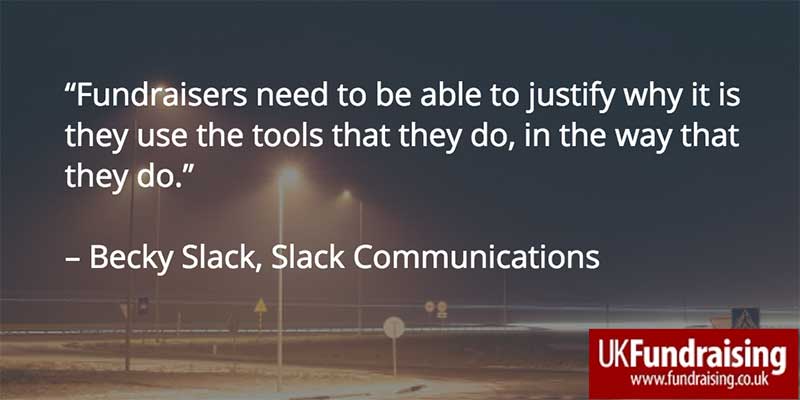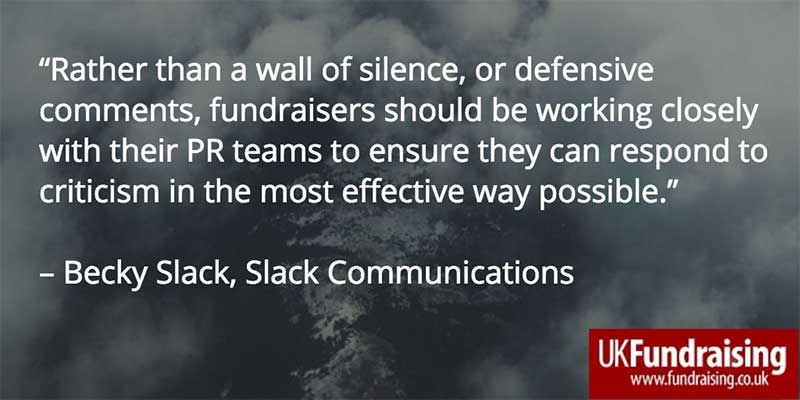Fundraisers do need to explain and justify how they fundraise
I am somewhat bemused, but also concerned, at the way in which fundraisers have reacted to the recent media furore over how they raise money.
“How dare journalists write such negative stories about our trade. We’re raising money for good causes – that gives us a right to ask”; or “It’s all sensationalist nonsense. They’ll go away tomorrow once they find something else to focus on”; or even better still – “Why don’t they just write nice things about all the wonderful work charities do thanks to the money we fundraisers raise?”
These comments make me think that fundraisers have no idea about how the media – in particular, news journalism – operates. And that is dangerous, putting our sector at risk.
Charities should be scrutinised, and they should expect to be scrutinised. They accept public donations, are awarded our trust and confidence, and are believed to be working on behalf of the greater good. It is only correct that their operations and their impact are questioned. We expect the same of MPs, of religious leaders, of big business…. So why not charities?
We may not like that scrutiny, but it is going to happen. What is important is how we handle it.
Rather than a wall of silence, or defensive comments, fundraisers should be working closely with their PR teams to ensure they can respond to criticism in the most effective way possible.
What makes an event a news item?
First, it is important to understand what a news story is. As Alfred Harmsworth, the early 19th century newspaper magnate once said: “When a dog bites a man that is not news, because it happens so often.”
Similarly, “fundraiser raises money for good causes” is not a story – unless you’re talking about the mega bucks raised by viral campaigns such as the Ice Bucket Challenge or Stephen’s Story.
However, “Old woman jumps off bridge as a result of harassment by charities” is a story. I do not wish this to sound crass or insensitive. But it is a good story. It meets all the criteria: it’s shocking, it’s negative. It has a generous old woman at its centre. It is not the type of behaviour expected by charities. No news journalist would turn that story down. Particularly not one that works for a tabloid.
Fundraisers do need to justify how they fundraise
Secondly, fundraisers need to be able to justify why it is they use the tools that they do, in the way that they do. And then they need to be able to explain this to journalists, supporters and anyone else who wants to know.
For instance:
• Why do fundraisers write to donors so many times throughout the year? How much does it cost the charity to send those mailings and how much money will they receive as a result? What would be the financial impact of not sending those mailings?
• How do fundraisers source the contact details of the people they write to, and how to they keep those details secure and use them appropriately? What do fundraisers know about their donors and the relationships they want with the charities they support? And how does this impact upon the way in which they communicate with them?
• How are fundraisers trained, and how often do they have to revisit the Code of Practice? What are the relationships charities have with the agencies they work with? How do they ensure the agencies act in a way that is ethical and proper? What is the RoI on this investment and why is that good (could it be better, and if so, why isn’t it?)?
These are all the types of questions that fundraisers should be able to respond to with ease, and which will help enhance understanding of the way in which our sector raises money. Sadly I suspect that not many fundraisers would be able to honestly raise their hand and say they know the answers. That is a problem that needs to be addressed with urgency.
Advertisement
Fundraisers + PR colleagues = better communication
Third, fundraisers need to work more closely with their PR colleagues, and indeed all their colleagues across the entire charitable sector, to better communicate why it is vitally important that they need to spend money in order to achieve impact.
As an investor, would you pump money into a business that didn’t invest in its staff, in R&D, in advertising and marketing? I doubt it. When we buy a can of coke, we recognise that part of the £1 covers the cost of production, the staff, logistics, advertising, etc. So why is the opposite true of charities? Why do people expect charities to deliver social benefit with no or very few overheads? I have never really understood that, and I would very much like to see our sector work together to change these perceptions.
Even if charity mailings didn’t kill Olive Cooke, even if the Daily Mail was inaccurate and sensationalist, her story has awoken something in the British public. The complaints received by the FRSB since then show this is not just a media scoop. This issue is not going to go away. It is going to run and run. We should prepare ourselves so we can respond effectively.
You may remember about a year ago there were plenty of politicians dismissing a certain purple-coloured party and its leader as a gimmick, as sensationalist nonsense, as a fad. Look what happened there. UKIP won almost four million votes in the General Election and is gaining increasing importance and power. Sticking your heads in the sand – as the Labour and Conservative parties did – is not going to help. Ignore this issue at your peril.
Becky Slack is the founder and managing director of Slack Communications, a publishing and communications agency with a social conscience. She has 20 years’ experience working in the media, including 13 as a journalist. She’s the former editor of Professional Fundraising magazine, and has previously worked as a corporate and major donor fundraiser. She’s also a trustee of the Flying Seagull Project, a tiny charitable arts and theatre group that travels the world making sick and disadvantaged kids laugh.






